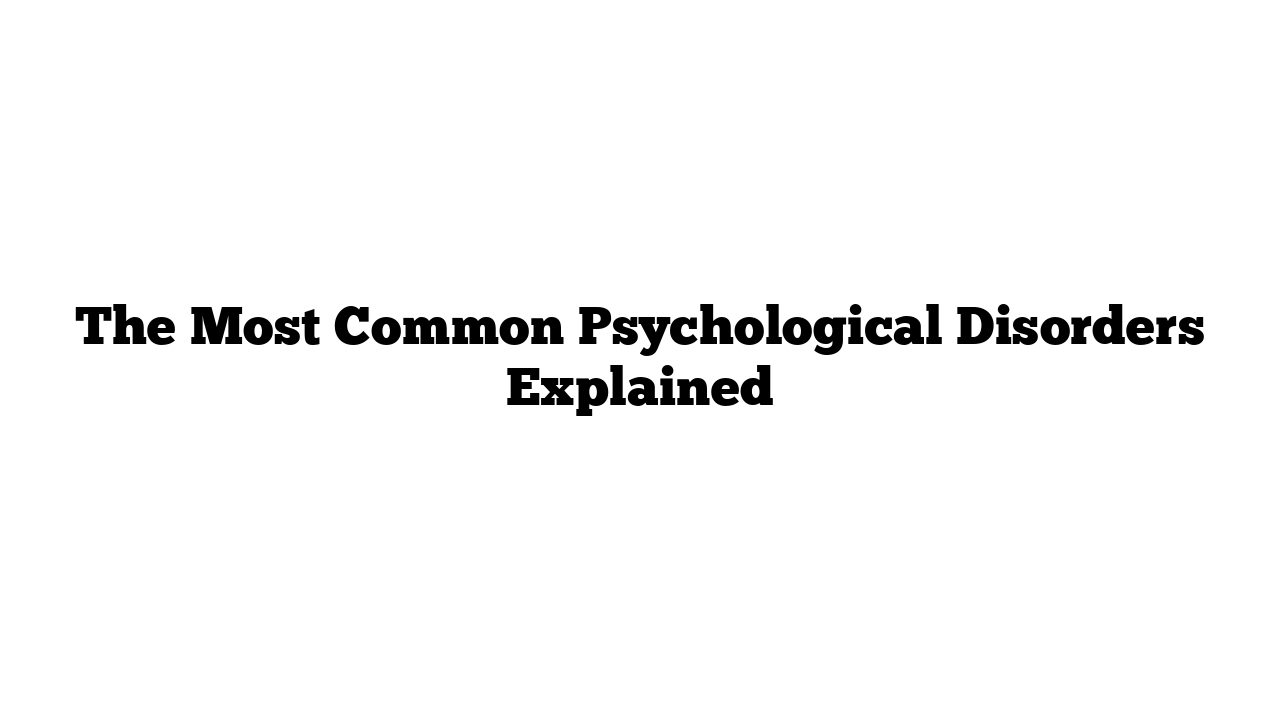Psychological disorders affect millions of people worldwide, including in the USA, where mental health is a growing concern. Stress, loss, and adversity can challenge us all. While it’s natural to experience moments of sadness or anxiety, prolonged symptoms could indicate an underlying condition. Let’s explore three of the most common psychological disorders: Major Depressive Disorder (MDD), Autism Spectrum Disorder (ASD), and Schizophrenia, focusing on their symptoms, impacts, and treatments.
1. Major Depressive Disorder (MDD)
Understanding Depression
It’s normal to feel low after a significant loss or during stressful situations. However, when symptoms such as low mood, hopelessness, appetite changes, and disrupted sleep persist for over two weeks and interfere with daily life, it may indicate Major Depressive Disorder (MDD).
Prevalence and Urgency
Depression is one of the most common mental health issues globally. According to the International Global Burden of Disease study, MDD is the third leading cause of years lived with disability (YLDs). In 2014, a report revealed that every 40 seconds, someone dies by suicide—a tragic statistic often linked to untreated depression.
Symptoms of MDD
The DSM-5 outlines nine key symptoms for diagnosing depression:
- Depressed mood (observable or reported).
- Loss of interest or pleasure in daily activities.
- Appetite or weight changes.
- Sleep disturbances, such as insomnia or hypersomnia.
- Fatigue or loss of energy.
- Feelings of guilt or worthlessness.
- Difficulty concentrating or making decisions.
- Psychomotor agitation or retardation.
- Recurrent thoughts of death or suicidal ideation.
For a diagnosis, five or more of these symptoms, including at least one of depressed mood or loss of interest, must be present for at least two weeks.
Severity Levels
- Mild: Symptoms exist, but functioning remains largely intact.
- Moderate: Symptoms significantly impair social and occupational life.
- Severe: Includes suicidal thoughts, delusions, or hallucinations.
Treatment Options
Treatment often includes:
- Psychotherapy (e.g., Cognitive Behavioral Therapy).
- Medications like antidepressants.
- Lifestyle modifications, such as exercise and mindfulness practices.
Despite being highly treatable, many cases of MDD remain undiagnosed due to stigma or lack of awareness.
2. Autism Spectrum Disorder (ASD)
What is Autism?
Autism Spectrum Disorder (ASD) is a neurodevelopmental condition characterized by challenges in social interactions, communication, and repetitive behaviors. It’s referred to as a “spectrum” due to the wide variety of symptoms and their severity.
Core Symptoms
- Social interaction difficulties, such as avoiding eye contact or feeling out of place in gatherings.
- Communication challenges, including misunderstanding hidden meanings in conversations.
- Repetitive behaviors, like head rocking or hand flapping.
- Sensory sensitivities to lights, sounds, or textures.
Prevalence
In the USA, approximately 1 in 60 children is diagnosed with autism, with boys being five times more likely than girls to be affected.
Types of Autism
- Classical Autism: Severe symptoms, often associated with developmental delays and low IQ.
- Asperger’s Syndrome: High-functioning autism with milder symptoms, often coupled with high intelligence.
- Pervasive Developmental Disorder (PDD): A less studied type, primarily behavioral.
Potential Causes
While the exact cause is unknown, a mix of genetic, environmental, and neurological factors is believed to contribute to autism.
Treatment and Support
There is no cure for autism, but therapies can help manage symptoms:
- Behavioral therapy to improve social skills.
- Occupational therapy for sensory challenges.
- Tailored education plans to support learning.
Autistics often excel in specific fields such as math, music, or art, showcasing the unique strengths they bring to the world.
3. Schizophrenia
What is Schizophrenia?
Schizophrenia is a severe mental disorder characterized by distorted thoughts, emotions, and perceptions. It often affects men more than women and can significantly disrupt daily functioning.
Key Symptoms
- Delusions: Beliefs in things that aren’t real.
- Hallucinations: Seeing or hearing things that don’t exist.
- Catatonia: Repetitive or purposeless overactivity.
- Neglect of hygiene, such as poor dental or personal care.
Causes
Schizophrenia is linked to an overproduction of dopamine in the brain, disrupting the balance of neurotransmitters and impairing neural circuits.
Treatment
- Antipsychotic medications like Risperidone to regulate dopamine levels.
- Therapies, including physical exercise, to manage symptoms.
Ongoing research aims to deepen our understanding of this complex disorder to develop better treatments.
Moving Forward with Awareness and Compassion
Understanding psychological disorders is essential to combat stigma and promote timely intervention. Whether it’s depression, autism, or schizophrenia, awareness and acceptance can make a significant difference in improving lives.
Reference website:
- Visit medicaltimes.io for reliable mental health resources.
- Learn more from National Institute of Mental Health.
- Explore additional insights at Mayo Clinic.
- Discover support options via Mental Health America.
Top 10 FAQs
1. What are the top signs of depression?
Persistent sadness, changes in sleep or appetite, and loss of interest in activities.
2. Can autism be cured?
No, but therapies can help manage symptoms and improve quality of life.
3. What causes schizophrenia?
A combination of genetic, neurological, and environmental factors.
4. How is autism diagnosed?
Through behavioral observations and developmental assessments by specialists.
5. Are psychological disorders hereditary?
Some, like schizophrenia, have genetic components, but environment also plays a role.
6. What therapies help with depression?
Cognitive Behavioral Therapy and lifestyle changes like exercise and meditation.
7. Is autism more common in boys?
Yes, boys are five times more likely to be diagnosed with autism than girls.
8. What are the risks of untreated depression?
Untreated depression can lead to severe outcomes, including suicide.
9. What medications treat schizophrenia?
Antipsychotic drugs like Risperidone are commonly prescribed.
10. How can families support loved ones with mental health issues?
By offering understanding, reducing stigma, and encouraging professional help.
